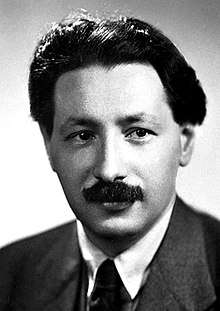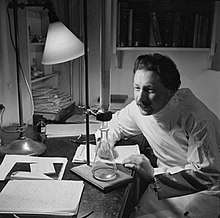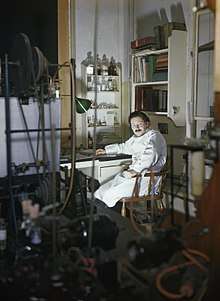Ernst Chain
Sir Ernst Boris Chain, FRS[2] (19 June 1906 – 12 August 1979) was a German-born British biochemist, and a 1945 co-recipient of the Nobel Prize for Physiology or Medicine for his work on penicillin.[3][4][5][6][7][8][9][10][11][12]
Sir Ernst Boris Chain | |
|---|---|
 Ernst Boris Chain (1945) | |
| Born | 19 June 1906 Berlin, Germany |
| Died | 12 August 1979 (aged 73) Castlebar, Ireland |
| Citizenship | German (until 1939) British (from 1939) |
| Alma mater | Friedrich Wilhelm University |
| Known for | The development of Penicillin |
| Spouse(s) | Anne Beloff-Chain (m. 1948–1979, his death) |
| Children | Benjamin, Danny & Judy[1] |
| Awards | Nobel Prize in Physiology or Medicine (1945) Fellow of the Royal Society (1948) Knight Bachelor (1969) |
| Scientific career | |
| Fields | Biochemistry |
| Institutions | Imperial College London University of Cambridge University of Oxford Istituto Superiore di Sanità University College Hospital |
Life and career


Chain was born in Berlin, the son of Margarete (née Eisner) and Michael Chain, who was a chemist and industrialist dealing in chemical products.[13][14] His family was of both Sepharadic and Ashkenazi descents. His father emigrated from Russia to study chemistry abroad and his mother was from Berlin.[15] In 1930, he received his degree in chemistry from Friedrich Wilhelm University. His father descends from Shealtiel Ḥen who was a prominent figure among the Catalonian Jewry and whose ancestors were the leading Jewish figures in Babylonia.[16]
After the Nazis came to power, Chain understood that, being Jewish, he would no longer be safe in Germany. He left Germany and moved to England, arriving on 2 April 1933 with £10 in his pocket. Geneticist and physiologist J.B.S. Haldane helped him obtain a position at University College Hospital, London.
After a couple of months he was accepted as a PhD student at Fitzwilliam House, Cambridge University, where he began working on phospholipids under the direction of Sir Frederick Gowland Hopkins. In 1935, he accepted a job at Oxford University as a lecturer in pathology. During this time he worked on a range of research topics, including snake venoms, tumour metabolism, lysozymes, and biochemistry techniques. Chain was naturalised as a British subject in 1939.[17]
In 1939, he joined Howard Florey to investigate natural antibacterial agents produced by microorganisms. This led him and Florey to revisit the work of Alexander Fleming, who had described penicillin nine years earlier. Chain and Florey went on to discover penicillin's therapeutic action and its chemical composition. Chain and Florey discovered how to isolate and concentrate the germ-killing agent in penicillin. For this research, Chain, Florey, and Fleming received the Nobel Prize in 1945.
Along with Edward Abraham he was also involved in theorising the beta-lactam structure of penicillin in 1942,[18] which was confirmed by X-ray crystallography done by Dorothy Hodgkin in 1945. Towards the end of World War II, Chain learned his mother and sister had been killed by the Nazis. After World War II, Chain moved to Rome, to work at the Istituto Superiore di Sanità (Superior Institute of Health). He returned to Britain in 1964 as the founder and head of the biochemistry department at Imperial College London, where he stayed until his retirement, specialising in fermentation technologies.[19]
On 17 March 1948 Chain was appointed a fellow by the Royal Society. On 8 July 1969 Chain was appointed a Knight Bachelor.[20]
He was a lifelong friend of Professor Albert Neuberger, whom he met in Berlin in the 1930s.
In 1948, he married Anne Beloff-Chain, sister of Renee Soskin, Max Beloff, John Beloff and Nora Beloff, and a biochemist of significant standing herself. In his later life, his Jewish identity became increasingly important to him. Chain was an ardent Zionist and he became a member of the board of governors of the Weizmann Institute of Science at Rehovot in 1954, and later a member of the executive council. He raised his children securely within the Jewish faith, arranging much extracurricular tuition for them. His views were expressed most clearly in his speech 'Why I am a Jew' given at the World Jewish Congress Conference of Intellectuals in 1965.[3]
Chain died at the Mayo General Hospital in 1979. The Imperial College London biochemistry building is named after him,[19] as is a road in Castlebar.[15]
See also
References
- New Scientist. Reed Business Information. 16 January 1986. p. 51. ISSN 0262-4079.
- Abraham, Edward (1983). "Ernst Boris Chain. 19 June 1906 – 12 August 1979". Biographical Memoirs of Fellows of the Royal Society. 29: 42–91. doi:10.1098/rsbm.1983.0003. JSTOR 769796.
- E. P. Abraham (2004). "'Chain, Sir Ernst Boris (1906–1979)". The Oxford Dictionary of National Biography. 1. doi:10.1093/ref:odnb/30913.
- Shampo, M. A.; Kyle, R. A. (2000). "Ernst Chain--Nobel Prize for work on penicillin". Mayo Clinic Proceedings. 75 (9): 882. doi:10.4065/75.9.882. PMID 10994820.
- Raju, T. N. (1999). "The Nobel chronicles. 1945: Sir Alexander Fleming (1881-1955); Sir Ernst Boris Chain (1906-79); and Baron Howard Walter Florey (1898-1968)". Lancet. 353 (9156): 936. doi:10.1016/S0140-6736(05)75055-8. PMID 10094026.
- Notter, A. (1991). "The difficulties of industrializing penicillin (1928-1942) (Alexander Fleming, Howard Florey, Ernst Boris Chain)". Histoire des Sciences Médicales. 25 (1): 31–38. PMID 11638360.
- Abraham, E. P. (1980). "Ernst Chain and Paul Garrod". The Journal of Antimicrobial Chemotherapy. 6 (4): 423–424. doi:10.1093/jac/6.4.423. PMID 7000741.
- Mansford, K. R. (1979). "Sir Ernst Chain, 1906-1979". Nature. 281 (5733): 715–717. Bibcode:1979Natur.281..715M. doi:10.1038/281715a0. PMID 399328.
- Abraham, E. P. (1979). "Obituary: Sir Ernst Boris Chain". The Journal of Antibiotics. 32 (10): 1080–1081. doi:10.7164/antibiotics.32.1087. PMID 393682.
- "Sir Ernst Chain". British Medical Journal. 2 (6188): 505. 1979. PMC 1595985. PMID 385104.
- "Ernst Boris Chain". Lancet. 2 (8139): 427–428. 1979. doi:10.1016/s0140-6736(79)90449-5. PMID 89493.
- Wagner, W. H. (1979). "In memoriam, Dr. Ernst Boris Chain". Arzneimittel-Forschung. 29 (10): 1645–1646. PMID 391241.
- "Ernst B. Chain". Nobel Foundation. 2013. Retrieved 17 July 2013.
- Forder, Arderne A. (1984). The more ye mow us down the more we grow: antibiotics in perspective. University of Cape Town.
- "Who was Sir Ernst Chain?". Connaught Telegraph. 6 October 2017. Retrieved 18 May 2019.
- Eliezer Laine and Zalman Berger, Avnei Chein - Toldot Mishpachat Chein, Brooklyn, New-York, 2004. Amazon link to book info
- "No. 34622". The London Gazette (Supplement). 5 May 1939. p. 2989.
- Jones, David S.; Jones, John H. (1 December 2014). "Sir Edward Penley Abraham CBE. 10 June 1913 – 9 May 1999". Biographical Memoirs of Fellows of the Royal Society. 60: 5–22. doi:10.1098/rsbm.2014.0002. ISSN 0080-4606.
- Martineau, Natasha (5 November 2012). "Sir Ernst Chain is honoured in building naming ceremony". Imperial College London. Retrieved 17 July 2013.
- "No. 44894". The London Gazette. 11 July 1969. p. 7213.
Bibliography
- Medawar, Jean; Pyke, David (2012). Hitler's Gift: The True Story of the Scientists Expelled by the Nazi Regime (Paperback). New York: Arcade Publishing. ISBN 978-1-61145-709-4.
External links
| Wikimedia Commons has media related to Ernst Boris Chain. |
| Wikiquote has quotations related to: Ernst Chain |
- Ernst Chain on Nobelprize.org including the Nobel Lecture, March 20, 1946 The Chemical Structure of the Penicillins
- Weintraub, B. (August 2003). "Ernst Boris Chain (1906–1979) and Penicillin". Chemistry in Israel. Israel Chemical Society (13): 29–32.
- Ernst Chain at Find a Grave
